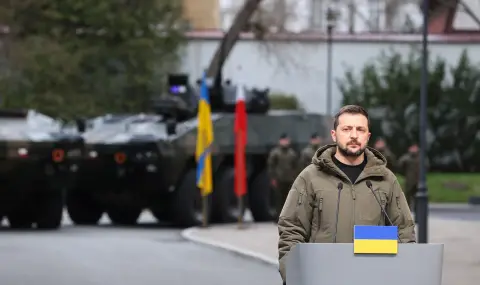European officials and NATO representatives stressed that a strong Ukrainian army, backed by European security guarantees, remains the most effective deterrent against future Russian aggression and a guarantee of long-term peace in Ukraine and Europe.
NATO Secretary General Mark Rutte gave an interview to the Ukrainian publication New Voice on 5 April and said that the "first level" of security guarantees for Ukraine should be the Ukrainian army, which is the "first line of defense in deterrence", the Institute for the Study of War (ISW) writes, quoted by news.bg.
Rutte added that Ukraine's European partners, including France, the United Kingdom and Italy, are also looking for ways to provide security guarantees after the conclusion of a peace agreement.
Ukraine's European partners are continuing preliminary technical discussions on a possible future peacekeeping contingent in Ukraine. Delegations from the British and French general staffs met with Ukrainian President Volodymyr Zelensky and Ukrainian military leaders on 4 and 5 April in Kiev to discuss details of how the first contingent of partner state forces could be deployed in Ukraine.
Zelensky said it was still to be decided where the forces would be deployed, their responsibilities and their authority to react in the event of a breach of a future peace agreement.
Finalising further details could take a month or more and the group would meet weekly.
Rutte said it was best to wait to deploy peacekeepers in Ukraine until a peace agreement was reached, but that the parties should continue to develop ideas now to implement once peace is achieved.
Ukrainian forces hit Russia's only factory that produces fibre optic cables - vital for optical drones of the Russian forces. The head of the Ukrainian Center for Countering Disinformation, Lieutenant Andriy Kovalenko, said on April 5 that unspecified drones had struck the Fiber Optic Systems plant in Saransk, Republic of Mordovia.
Kovalenko said that the plant produces materials for control, communication and data transmission systems, including drone control in the Russian army. Geolocated footage released on April 5 shows an explosion and fire in Saransk.
The Fiber Optic Systems plant is the first and only fiber optic manufacturing plant in Russia.
A Russian insider claims that the plant produces all of the fiber optic cables for the Russian army.
The Russian Ministry of Defense (MOD) claims that Russian forces shot down three drones over the Republic of Mordovia overnight, and the head of the Republic of Mordovia, Artyom Zdunov, claims that a drone hit a plant in the republic.
ISW cannot independently verify the damage to the fiber optic plant, but successful Ukrainian strikes on the plant are likely to reduce the Russian military's ability to supply troops with fiber optic cables to use with first-person view (FPV) drones on the battlefield.
The Ukrainian publication "Suspilne" reported on April 5 that sources in the Security Service of Ukraine (SBU) said it carried out the drone strikes on the Promsintez plant in Chapaevsk, Samara Oblast, on the night of April 4-5. At least 20 explosions and several fires were reported.
The sources said Promsintez produces industrial explosives, including ammonal, ammonite and granulite, and that the plant had stopped operations after the strike. The Russian Defense Ministry said Russian forces had destroyed six drones over the Samara Oblast overnight, while Samara Oblast Governor Vyacheslav Fyodorishchev said Ukrainian forces had carried out a drone strike on an industrial plant in Chapaevsk, causing a fire.
Ukraine's European partners continue to provide technical support. "Reuters" reported on April 4 that the CEO of French commercial satellite communications provider Eutelsat, Eva Berneke, said that the company has been providing Ukraine with its high-speed satellite internet service for about a year, funded by the German government.
Berneke said there were fewer than 1,000 terminals connecting Ukraine to Eutelsat's network, but that Eutelsat hoped to increase the number of terminals to between 5,000 and 10,000 "within weeks." Eutelsat spokeswoman Joanna Darlington added that it was unclear whether the EU collectively or individual countries would fund additional Eutelsat efforts for Ukraine.
Russian forces have advanced in Kursk Oblast, particularly in the Guevo area, south of Sudzha. Ongoing fighting is reported near Oleshnya and Basovka. Ukrainian forces continue to defend positions in these areas.
Ukrainian forces have launched limited ground attacks in northern Belgorod Oblast, including in the areas of Demidovka and Popovka, northwest of the city of Belgorod.
Ukrainian forces have made progress south of the village of Zapadnoye, north of Kupyansk. Russian sources claim their own movements near Piski and Kamyanka, but these claims remain unconfirmed.
